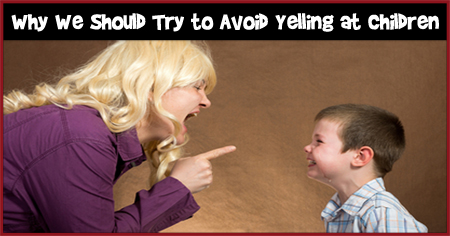 The behaviour of children makes parents go mad at times and they end up yelling at them. However, it is not good to yell at children frequently. Read on to know why we should try to avoid yelling at children.
The behaviour of children makes parents go mad at times and they end up yelling at them. However, it is not good to yell at children frequently. Read on to know why we should try to avoid yelling at children.No child is perfect and she will always argue, ignore her chores, fight with her siblings or simply not pay attention to you. These little inconveniences will test the patience of any loving and caring parent. There are other parents as well who end up yelling at their children “because they
do not listen otherwise”. However, research has found out that children who are frequently shouted at go on to develop serious psychological and emotional issues in adult life. Therefore, what are the ways in which yelling damages the child’s sanity and happiness? Let us take a look at why we should try to
avoid yelling at children.
1. Affects Self-Confidence
Shouting is a form of emotional abuse, as it renders a child to think of herself as insignificant. It also lowers child’s self-confidence as she believes that she is unworthy to be loved.
Verbal abuse also does severe damage to their self-image, where they feel incapable to impact the society in any way. To children, shouting is a threat to their security, feeling of love, safety and confidence. They feel responsible for their parent’s anger, as they do not understand the concept of “alternative explanations of anger”. These can develop into behavioural issues, anxiety, insomnia and academic problems.
2. Develops a Sense of Aggression
Contrary to slightly older children or teenagers, younger children cannot answer back. Therefore, the constant shouting and criticising can develop in them a sense of frustration. Children do not remember the actual shouting, but the loud voice, the body language and the words used have a huge impact on them. Insult, criticism and sarcasm should be avoided at all costs as a child does not understand either of these actions. The need to vent out their hidden anger can come out in the form of social problems with peers, invading personal space, emotional issues and thwarted coping skills.
3. Develops a Sense of Fear
Many children who have suffered verbal abuse have gone on to develop severe fear of loud voices. A young child may react to shouting by wincing, shaking or hiding. The fear can become severe over time and hinder the children’s ability to make friends. Such timid children are often unable to deal with conflicts which makes them withdraw from such situations rather than resolving them. They may also become targets for bullying as they start school. The repeated bouts of screaming and bullying can overall have a negative effect on the child’s psychological health.
4. Concentration Problems
It is common to see children struggling with concentration problems if they come from a verbally abusive home. Children tend to “tune out” certain instructions just as they do when they are being shouted at. This defence mechanism becomes negative as they suffer problems in focusing. Lack of concentration, which can also be a result of emotional abuse, affects children in middle school as well. Such children are unable to concentrate for longer periods of time, which can be remedied with the help of individual attention from teachers and tutors.
5. Weakens the Bond Between Parent and Child
Shouting is a form of emotional mistreatment which brings out a constant flow of stress and agitation in a child. They become frustrated with the attempts to please their parents as they do not know what to expect. They also harden their heart against their parents and slowly stop regarding them as a source of unconditional love and support. Once they lose their trust, they will not try to please their parents any longer. Such a child will grow up to be an emotionally troubled person.
The biggest reason for
yelling is that parents do not try to control their anger. However, it is time for them to give up the conventional methods of parenting, and to adopt a gentler approach. Parenting is a tough job, but it can be a lot easier by not raising your voice but laying out simple family rules instead to convey your message better to your child.
Why do parents yell at children? How does yelling affect children? How to avoid yelling at children? Discuss here.




